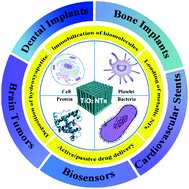Progress in TiO2 nanotube coatings for biomedical applications: a review
Abstract
Titanium dioxide nanotubes (TNTs) have drawn wide attention and been extensively applied in the field of biomedicine, due to their large specific surface area, good corrosion resistance, excellent biocompatibility, and enhanced bioactivity. This review describes the preparation of TNTs and the surface modification that entrust the nanotubes with better antibacterial property and enhanced osteoblast adhesion, proliferation, and differentiation. Considering the contact between TNTs’ surface and surrounding tissues after implantation, the interactions between TNTs (with properties including their diameter, length, wettability, and crystalline phase) and proteins, platelets, bacteria, and cells are illustrated. The state of the art in the applications of TNTs in dentistry, orthopedic implants, and cardiovascular stents are introduced. In particular, the application of TNTs in biosensing has attracted much attention due to its ability for the rapid diagnosis of diseases. Finally, the difficulties and challenges in the practical application of TNTs are also discussed.

- This article is part of the themed collection: Recent Review Articles


 Please wait while we load your content...
Please wait while we load your content...